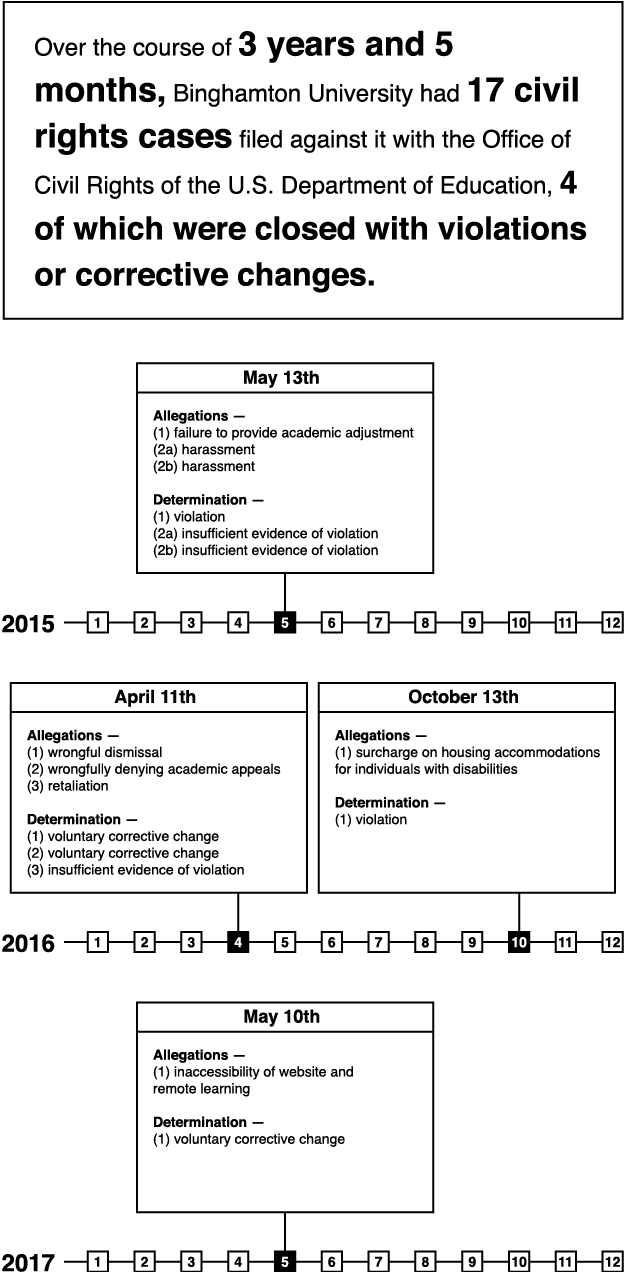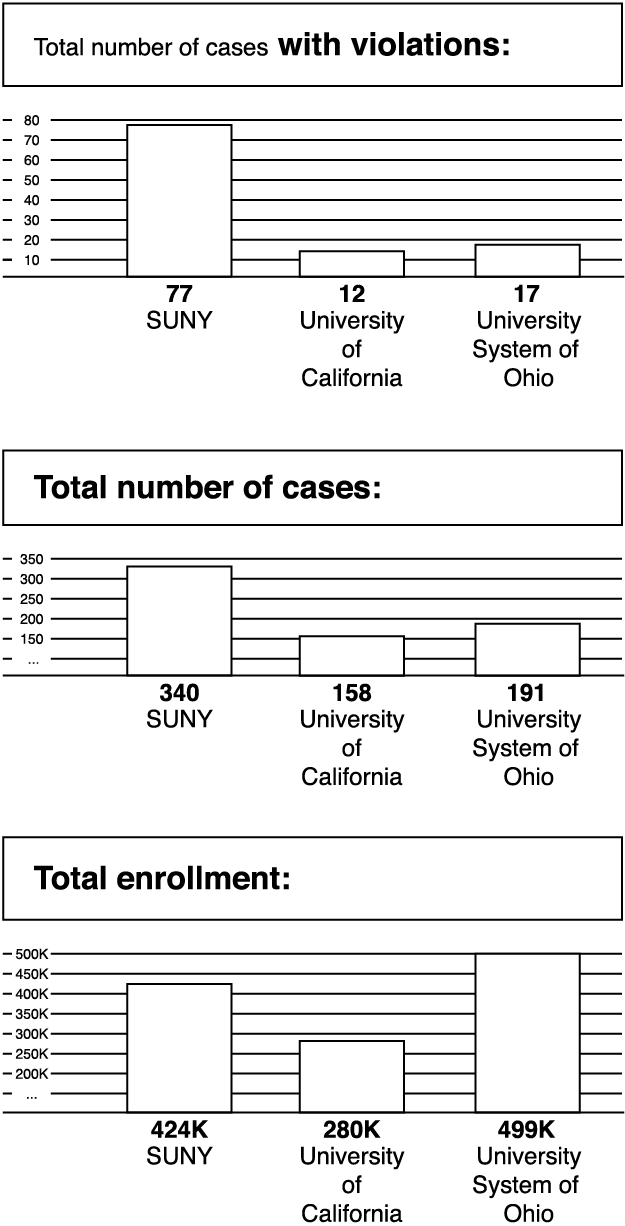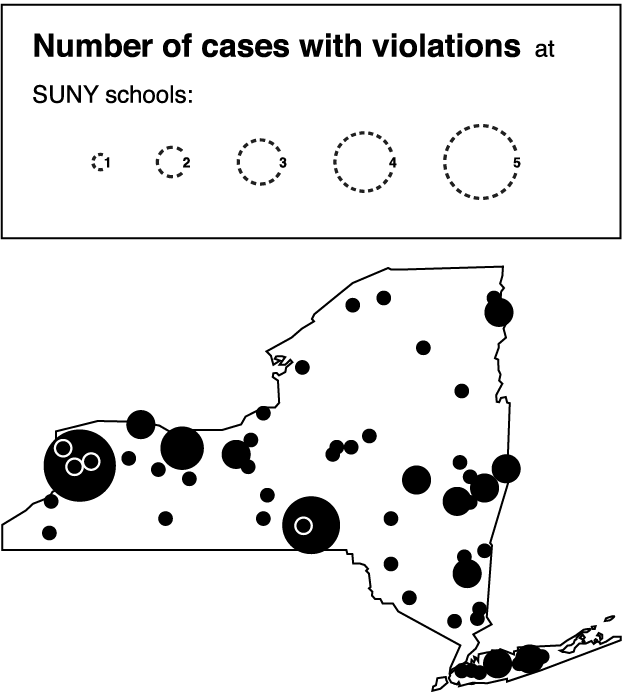A student with a disability taking an exam on the floor. An increased cost for medically required single dorm rooms. At Binghamton University, these are just two of the four civil rights cases that have resulted in violations or corrective changes over the course of three years and five months.
But this isn’t just exclusive to BU, although the University has the second-highest number of civil rights violations and corrective changes in the SUNY system, behind Buffalo State College. From Jan. 20, 2015 to May 2, 2018, 17 total cases were filed against BU with the U.S. Department of Education’s Office of Civil Rights (OCR) and resolved. In the four cases that were resolved with violations or corrective changes, the OCR found that the University was violating several anti-discrimination laws housed under Section 504, part of the Rehabilitation Act of 1973 that requires the needs of students with disabilities to be met as satisfactorily as the needs of nondisabled students, and the Americans with Disabilities Act (ADA).
Ryan Yarosh, director of media and public relations at BU, wrote in an emailed statement that the University fully cooperated with the OCR while resolving the complaints.
“From January 2015 to May 2018, we worked with OCR on clarification in regards to four specific complaints, and adjustments were made to campus procedures to address those complaints, such as providing additional training for employees,” Yarosh wrote. “Binghamton continues to put the health and safety of our students first. We encourage our campus community to be open and have always endorsed a ‘see something, say something’ atmosphere.”
Yarosh also wrote that in two of the four cases, the University voluntarily entered into resolution agreements, pledging to make corrective changes to address complainant concerns before the OCR completed its investigation.
“Oftentimes, we are not approached regarding a specific concern before it is filed directly with OCR, and a majority of complaints are dismissed,” Yarosh wrote. “Also, it should be noted that voluntary resolution agreements are just that — the institution entering into an agreement does not amount to a violation — it agrees that it is willing to voluntarily take some action to address a concern raised in a complaint.”

As a whole, the SUNY system, which has a total enrollment of roughly 424,000 students, has seen 340 civil rights cases filed with the OCR between January 2015 and May 2018, 77 of which resulted in violations or corrective changes — a high number in comparison to other large state university systems across the country. In the University of California system, which has an enrollment of roughly 280,000, 12 cases across the same time period resulted in violations or corrective changes, according to data from a ProPublica investigation into civil rights violations at higher education institutions nationwide. In the University System of Ohio, which enrolls almost 500,000 students, 17 cases were found to result in violations or corrective changes.

All but two SUNY schools, Tompkins-Cortland Community College and SUNY Upstate Medical University, had cases filed against them that resulted in violations or corrective changes. At Buffalo State College, five cases have resulted in violations or corrective change, including a case where the OCR determined that the college failed to “take prompt and effective action reasonably calculated to stop any discrimination [or] harassment, prevent its recurrence and remedy its effects.” At the University at Albany, the OCR determined men had more opportunities to participate in athletic activities than women for the 2014-15, 2015-16 or 2016-17 academic years, a violation of Title IX, a federal law protecting students from discrimination based on sex. And in a case at SUNY Cobleskill, the OCR found that parking lots near Wheeler Hall, located on the western side of the campus, didn’t meet standards set by the ADA, making it difficult for individuals parking in specified accessible spaces to access the building. Holly Liapis, SUNY press secretary, wrote in an emailed statement that SUNY aims to ensure all campuses are in compliance with federal civil rights laws.
“As the largest public higher education system, The State University of New York strives to offer a safe and inclusive learning environment,” Liapis wrote. “The prevention of sexual harassment and assault and discrimination of any kind is a top priority. We have been working to provide resources and encourage students and faculty to make us aware of any issues. We also have ongoing partnerships with government agencies and non-profits to develop better policies, resources and trainings.”

It is not the first time SUNY has seen wide-ranging violations, corrective changes and compliance concerns. In 2013, the OCR concluded a compliance review investigation into SUNY that determined the system was failing to respond promptly and effectively to Title IX complaints, both within individual campuses and at the SUNY level.
“OCR found that deficiencies in the investigations of these complaints resulted in numerous complainants not receiving prompt, timely [and] adequate investigations of their complaints; not receiving notice of the outcomes of their complaints; and not being provided equal opportunities to attend pre-hearing conferences, to present evidence and witnesses at the hearing and to file an appeal of the university’s determination,” states the case’s determination letter. “OCR also found that the universities sometimes failed to consider providing complainants with interim relief during the pendency of their Title IX investigations.”
At BU, one case, opened in May 2015, alleged that the University failed to provide accessible seating to a Harpur College student with a disability on two occasions during the spring 2015 semester, according to a letter of determination summarizing the OCR’s investigation. The complainant, who was enrolled in a philosophy course, said she was unable to sit at the accessible desk in the classroom on Feb. 12, 2015 and May 14, 2015, during the final examination for the course.
In the first incident, the complainant said when she attempted to sit at the accessible desk at the beginning of class on Feb. 12, a teaching assistant (TA) for the course said she could not sit there. The complainant said she told the TA she needed to use the accessible seating, however, the TA would not allow her to do so. Because of this, the complainant sat in a stand-alone chair with her notebook in her lap.
On May 14, the complainant said that she arrived late for the final examination for the course, and another student was already seated at the accessible desk. The complainant said she approached a TA to ask where she should sit, since the accessible desk was already occupied. The TA directed the complainant to sit at an inaccessible desk, and when the complainant explained she could not do so, the TA failed to find accessible seating for her. Therefore, the complainant was forced to complete the examination while sitting on the floor, without a desk.
“The complainant stated that because she was denied accessible seating, she was forced to complete the exam without a desk while seated on the floor; and, she suffered humiliation in front of her peers,” the letter read.
The complainant had an accommodation plan with the University’s Services for Students with Disabilities office (SSD), which she said was shared with the course professor. Although the professor denied ever receiving the complainant’s accommodation plan, the OCR determined that on Feb. 25, 2015, the SSD director contacted the professor about the difficulty the complainant had in being unable to sit at the accessible desk on Feb. 12.
“In a handwritten note signed by the SSD director, she documented that she left a message for Professor 1 asking him to speak with his TAs regarding the ‘purpose of the [disability] desk and their need to make it [available] for students with disabilities,’” the letter read.
The OCR determined that the University failed to properly accommodate the complainant’s disability on May 14. In a resolution agreement, the University agreed to offer the complainant an opportunity to retake the course at no cost or refund tuition for the course. The University was also directed to provide training on accommodating academic adjustments and auxiliary aids for students with disabilities to administrators, faculty and staff, including all teaching faculty and teaching assistants within the philosophy department.
“The complainant stated that because she was denied accessible seating, she was forced to complete the exam without a desk while seated on the floor; and, she suffered humiliation in front of her peers.” — Case No. 02-15-2331
Another case, opened in April 2016, alleged that BU had discriminated against a complainant pursuing a graduate degree in social work and retaliated against the complainant for filing academic appeals and raising allegations of disability-related discrimination.
According to the case’s letter of determination, the complainant was a student enrolled in the University’s Master in Social Work (MSW) program in fall 2013. All students in the MSW program must complete 16 credit hours of field instruction to graduate, and cannot receive a failing grade in any course. The complainant failed a field instruction class after her field placement was terminated because University employees at the placement raised concerns about her demeanor and reactions to feedback.
Following her dismissal from the program, the complainant filed several academic appeals, all of which were denied.
“Specifically, the complainant asserted that she was terminated from the [field placement] because the [placement director] regarded her as having a mental impairment,” the letter read. “The complainant also asserted that during the field placement, she disclosed to her [field instructor] her status as a [redacted], and believes that the field instructors knowledge of her disability could have negatively influenced her perceptions of the complainant.”
BU voluntarily entered a resolution agreement prior to the conclusion of the investigation. In the agreement, the University pledged to conduct a detailed investigation into the complainant’s allegations, and if the investigation found discrimination had occurred, offer the complainant reinstatement into the MSW program. It is unclear whether that investigation uncovered evidence of discrimination. The University also committed to additional training for faculty and staff regarding discrimination based on disability, the University’s grievance procedures and behaviors that constitute discrimination, harassment and retaliation.
“The complainant asserted that she was terminated from the [redacted] field placement because the director regarded her as having a mental impairment.” — Case No. 02-16-2193″
In a case filed in October 2016, a complainant alleged BU was effectively imposing a housing surcharge on single dormitory rooms, charging more for singles and medical singles than other room types, even in cases in which the housing was provided as an approved medical accommodation.
The case’s letter of determination notes the that documented and approved medical single rooms were more expensive than most other room types at the University. Only single rooms in Newing College that provided break housing, supersingles in Hillside and Susquehanna communities and family apartments in Susquehanna Community cost more.
“For academic years 2015-2016 and 2016-2017, all students who were placed in medical single rooms were charged the published room rate for documented and approved medical single rooms, regardless of whether the housing was provided as an approved disability accommodation and a lower cost room could have otherwise been provided,” the letter read.
Yarosh wrote that there was “confusion over the process used for requesting special housing accommodations,” and the University took steps to correct the issue. In the case’s resolution agreement, BU agreed to adopt and publish new policies for housing accommodations to ensure that students with disabilities who are approved for single or medical single rooms are not charged higher rates solely on the basis of their needs. Officials and staff handling housing accommodations would receive training in the new policies. The University also agreed to assess rates charged to students with disabilities in single or medical single rooms during academic years 2015-16 and 2016-17 and provide individual reimbursements as necessary.
“”The complainant alleged that the University discriminates on the basis of disability, by imposing a housing surcharge on single dormitory rooms provided as an accommodation for a student’s disability.” — Case No. 02-17-2010″
In a case opened in May 2017, a complainant alleged BU’s website was not accessible to individuals with disabilities, specifically those with low vision and impairment of fine motor skills.
According to the case’s letter of determination, the OCR examined several pages on the University’s website, including its homepage and pages providing information about its Admissions Office, Financial Aid Office and SSD.
Before the investigation was concluded, the University entered a voluntary resolution agreement, wherein it agreed to several corrective procedures, including an audit of existing content on the University website and a new list of policies for the functionality of new content. According to Yarosh, the University wasn’t aware that its website was inaccessible to those with disabilities until the OCR began its investigation, at which time it quickly made changes to bring the website into compliance.
“With the explosion of electronic educational resources — BlackBoard materials, video enhancements to textbooks — it was challenging for all universities to keep pace with ensuring that all such materials were accessible, and the standards by which one would find something to be ‘accessible’ weren’t always easy to understand,” Yarosh wrote.
There are also cases pending against SUNY schools that have yet to be resolved — 33 cases, as of March 29, according to the Office of Civil Rights. None of the cases, which have yet to be fully investigated, involve BU.
To view the cases resolved with violations or corrective changes filed against SUNY schools between Jan. 20, 2015 and May 2, 2018, visit Pipe Dream’s SUNY Collegiate Civil Rights Record (CCRR) database at ccrr.bupipedream.com.



